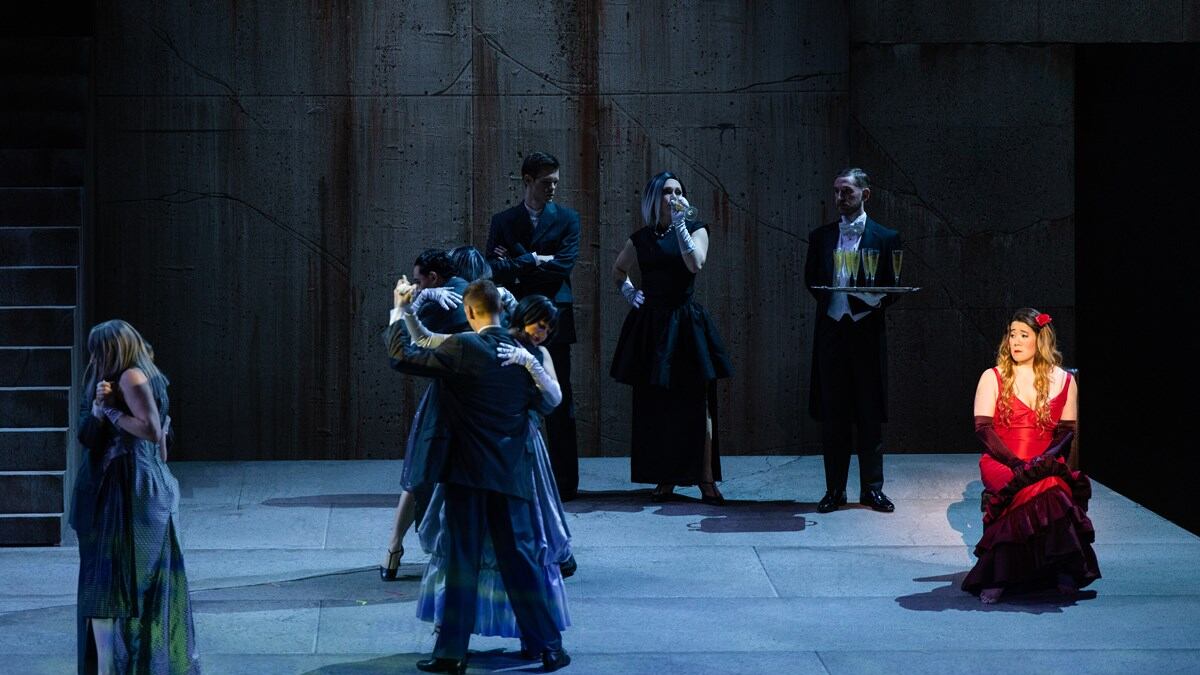“Good evening, opera lovers and mermaids!”
So declared Portland Opera general director Sue Dixon on April 22 as she introduced a Czech opera for its first Portland performance: Rusalka, the ninth (and most internationally renowned) opera of composer Antonín Dvořák (with a libretto by Jaroslav Kvapil).
A dark adaptation of a Slavic folktale about a water spirit’s star-crossed romance with a human prince, the opera debuted at the Keller Auditorium, with two more performances to follow on the 28th and 30th. In addition, special previews, free and open to the public, were held April 15 at the Gresham Library and April 16 at Salem Public Library.
There were a few surprise casting changes. Among them Rachel Hauge as the Second Wood-Sprite, replacing Camille Sherman, and Ben Gulley as the Prince, replacing Kevin Ray. During her introduction, Dixon stated that Pulliam had to depart the role at the last minute, and Gulley, commendably, was able to fill in with only a day’s rehearsal.
Remarkably, the entire cast performed the opera in its original language, with English subtitles projected above the stage. Štěpán Šimek served as Czech language coach, and while most in the audience would not know the language (at one point, a patron asked his Hungarian-speaking friend if he could pick up the Czech, but his friend replied that the two languages are unrelated), the cast beautifully captured the poetry of Kvapil’s libretto.
Much of the cast for this production consists of newcomers to the Portland Opera, just as this production is a company newcomer itself. The aforementioned Gulley is one, as are almost all the principal players: Andrew Potter as Vodník, the Spirit of the Lake (alternatively translated in the subtitles as “Water Gnome”), Othalie Graham (acclaimed for her performances as Lady Macbeth) as the Foreign Princess, Jill Grove as Ježibaba, the Witch (a role she also played in Houston and New Orleans), and Karen Vuong (who recently played Mimì in Seattle Opera’s La Bohème) in the title role.
Everyone played their part with their own distinct mannerisms: Potter was a lumbering, lamenting elder spirit; Grove made small, quick gestures (and a wink or two in the audience’s direction) to signal the Witch’s irritable attitude; and Vuong, whose character voluntarily gives up her voice for the second act, acted more with delicacy of movement, at least until Rusalka becomes so enraged she pounds a chaise longue with her fists.
The plot point of Rusalka giving up her voice so a witch can send her onto dry land for the love of a prince is very familiar to audiences thanks to The Little Mermaid. Though this is no happily-ever-after fairy tale, the company made a point of leaning into the similarities in the marketing.
Toi, Toi, Toi, Portland Opera’s magazine, includes a conversation between director Eric Simonson and conductor Elias Grandy, with Simonson highlighting the connection, but also emphasizing that Dvořák took inspiration from the darker folk tales of Eastern Europe. Grandy asserts that “nothing is black and white in life. It’s human.”
To that end, the story lacks a villain among the characters. Instead, the villains are the intangible perils of loneliness, desperation, poor communication, and the wandering eyes of men, which all compound over three tragic acts. Even Ježibaba is no villain. At worst, she is easily fed up with Rusalka, but the comical weariness of Grove’s performance made her an instant crowd favorite.
Equally popular were the three Wood-Sprites: Madeline Ross, Rachel Hauge, and Jasmine Johnson invited the audience to laugh along with their characters’ youthful, self-absorbed mirth. A particular highlight was the moment where they all sat and gazed into a hand mirror together, as if they were taking a selfie.
After years of popular demand, Rusalka has finally arrived in Portland, and all involved earn an enthusiastic “Bravi tutti!”
SEE IT: Rusalka plays at the Keller Auditorium, 222 SW Clay St., 503-248-4335, portlandopera.org. 7:30 pm Friday, April 28, and 2 pm Sunday, April 30. $40-$250.
